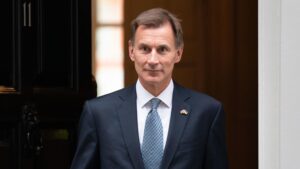
Britain’s prospects for growth have declined, leaving the chancellor with a multibillion-pound hole before the budget in March, the government’s spending watchdog has warned.
In a private submission to the Treasury, the Office for Budget Responsibility told Jeremy Hunt that it overestimated the prospects for medium-term growth in the economy last year and it intends to revise its forecasts down.
The downgrade would wipe out all of the government’s £9.2 billion headroom in Hunt’s autumn statement and limit his scope for manoeuvre as he draws up plans for the budget.
In November the OBR forecast that while the economy would shrink by 1.4 per cent this year it would pick up next year, with GDP averaging about 2.6 per cent over the rest of the forecast period. But The Times understands that the OBR intends to reduce its forecasts by between 0.2 and 0.5 per cent due to weakness in the economy and shortages in the labour market.
It now believes that, while any recession this year will be “shorter and shallower” than expected, the long-term economic prospects are bleaker.
The forecasts are significant because they could require Hunt to pencil in further savings in his March budget to keep within the fiscal rules he set in November to reduce debt.
Any downgrade would be partly offset by the lower-than-expected cost of the energy price guarantee after recent falls in wholesale prices. However, government sources said that this would have only a small effect on overall government finances because it would be offset by lower revenues from the windfall tax on energy companies.
While the OBR numbers can change between now and March, the present forecasts will form the basis of Treasury planning for the budget.
“There seems to be a view out there that Hunt suddenly has all this money to play with for tax cuts,” one government figure said. “But that is not the view internally. The OBR figures suggest that the prospects for medium-term economic growth will actually be worse than they were in November.”
Official figures showed yesterday that government borrowing shot up to record levels last month on the back of a climbing debt-interest bill and the cost of energy subsidies for households and businesses. Public sector borrowing hit £27.4 billion, the highest for December since equivalent records began, according to the Office for National Statistics (ONS). It eclipsed the high borrowing of the pandemic and was far above economists’ expectations of £17.7 billion. Government borrowing is now £9.8 billion higher than projections from the OBR at the time of the autumn statement. Total UK borrowing stands at 99.5 per cent of GDP with the debt-to-GDP ratio at levels last seen in the early 1960s.
Mark Carney, the former governor of the Bank of England, said yesterday that the UK was in the “most difficult” position of all the major world economies. He told LBC radio: “Everybody’s been hit — some countries more than others — by the energy shock, the UK certainly has been hit by the aftermath of Covid, it’s been amplified by the separation from the European Union and the combination of those factors have weighed on the economy.”
It is also understood that Hunt has been warned by Treasury officials that although inflation has fallen from its peak faster than expected, underlying inflation that includes pay growth has remained higher than anticipated. He has been told that this could result in interest rates being pushed higher and a “longer recession and a weaker recovery”.
Hunt is under growing pressure from Tory MPs and business groups to use the budget to announce targeted tax cuts to stimulate growth. They warn that unless the government takes action now to kickstart the economy the UK will become trapped into anaemic growth, leading to further tax increases to pay for public services.
Senior government figures reject this and insist that any tax giveaways in March funded by increased borrowing would repeat the mistakes of Liz Truss and risk a further increase in interest rates. “We must make sure that debt continues to fall with credible headroom or the risks to the economy would be even greater,” they said.
Responding to yesterday’s borrowing figures, Hunt said the government was making “tough decisions to get debt falling”. “Right now we are helping millions of families with the cost of living but we must also ensure that our level of debt is fair for future generations,” he said. “We have already taken some tough decisions to get debt falling, and it is vital that we stick to this plan so we can halve inflation this year and get growth going again.”
In The Times yesterday William Hague urged the prime minister not to cut taxes. He wrote: “There is no winning position for the Conservatives that does not involve being the most responsible party on the economy. There is no winning formula for our economy that doesn’t include a mix of spending and tax incentives to help us compete. Those two truths show what to do with a reflex urge to cut taxes at all costs. Resist it.”
Read more:
UK economy growth prospects gloomier than predictions leaving Hunt with budget black hole






